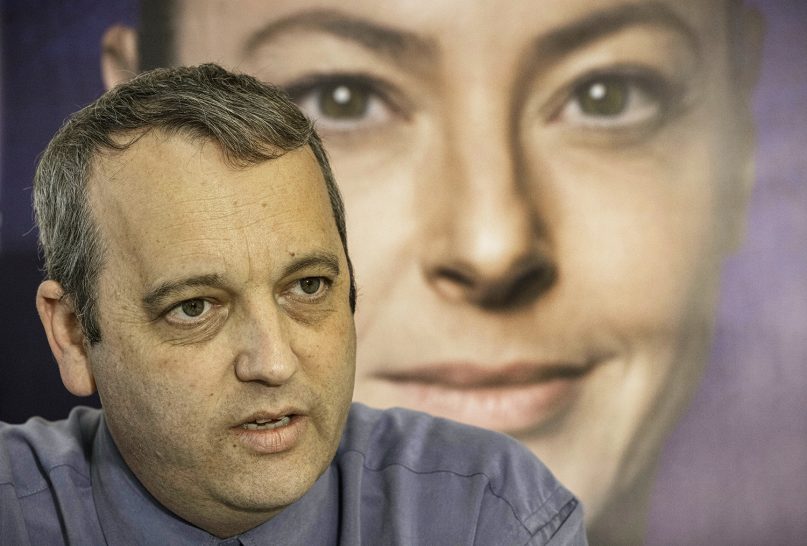(RNS) — Quick quiz. What is the most significant date in the history of Reform Judaism?
- Oct. 18, 1818, the date of the dedication of the Hamburg Temple in Germany — the first Reform synagogue?
- Rosh Hashana, 1850 — when Rabbi Isaac Mayer Wise got into a fistfight with a congregational officer in Albany, New York, and then went off to found a new synagogue — and ultimately, a new movement?
- July 11, 1883 — the infamous “treife banquet” in Cincinnati, which caused traditionalists within the nascent Reform movement to rebel, and to realize that perhaps we had gone a little too far?
Those are all great candidates, but in my opinion, the most important day in the history of Reform Judaism was Tuesday, March 23, 2021.
That was when we learned that Rabbi Gilad Kariv, president and CEO of the Israel Movement for Reform and Progressive Judaism, became the first Reform rabbi to be elected to Israel’s Knesset. He is No. 4 on the Labor Party list.
This is a moment of profound pride for all non-Orthodox Jews, especially because there are ultra-Orthodox Jews for whom this is nothing less than an abomination, and who have called for a boycott against Kariv. It is the ultimate pre-Pesach gift — the idea that progressive Judaism’s definition and experience of religious freedom will now find an official voice on the floor of the Knesset.
Dig deeper, please.
You do realize why Kariv won, don’t you? While we presently lack the precise numbers, let us say what is both obvious and crucial.
A significant number of Israelis voted for Labor — and thus, wittingly or unwittingly, for Kariv’s vision of Judaism in the Jewish state.
That is huge. For years, I have noticed this: that wherever the Israel progressive movement places a rabbi, a community springs up, like mushrooms, around her or him.
Israeli progressive synagogues are hardly attracting just “Anglo-Saxon” Jews who live in Israel, and who are already familiar with liberal Judaism. It is now clear that there is a sizable market for liberal Judaism among Israelis themselves. They are rejecting both state Orthodoxy and the ambient secularism that is part of Israeli life. It is to them that Kariv owes his victory.
So, yes: All in all, this has been a very good month for Israeli progressive Judaism.
Kariv’s victory comes on the heels of the Israeli Supreme Court’s decision to register, for the purposes of citizenship, those Jews who had converted to Judaism under the auspices of non-Orthodox Judaism in Israel.
Which itself comes on the heels of the Israel progressive movement’s new prayer book, Tefilat Ha-Adam (The Human Prayer) — a true treasure trove of devotion. I am proud that my synagogue, Temple Israel in West Palm Beach, Florida, contributed to its publication.
Right about now, I am hoping to be able to return to Israel this summer. Every time I visit, which is usually once a year, I find that the inroads that progressive Judaism has made into Israeli religious life are deeper than we had ever thought.
Two “postcards” will make that clear:
- Late Friday afternoon. The “first station” in Jerusalem, the old Ottoman period train station, which has been renovated into shops, restaurants, amusements and public spaces. There, you can waltz into Shabbat through various musical events. Singing, dancing — especially through the massive talent of the musical group Nava Tehila.
- Late Friday afternoon. The port in Tel Aviv. There, hundreds of revelers join together to sing and dance the kabbalat Shabbat service, led by Beit Tefilah Israeli.
“Secular” Jews are now saying to the Israeli Orthodox establishment: “These texts and celebrations do not belong solely to you. They are the inheritance of the entire house of Israel. They are ours, as well.”
Because this is not your father’s or grandfather’s secularism. It is a specifically Israeli form of secularism. Some Zionists were all too willing to shed the burdens of the Jewish past. Not these secularists.
As Micah Goodman makes it clear in his new, brilliant book “The Wondering Jew“:
The form of secularism that shakes off the past, rebels against tradition, and attacks religion is only one kind of secularism. The form of religion that opposes change, closes itself off from the world, and attacks Western values is only one kind of religion… Many of the founders and philosophers of Israeli secularism criticized the extreme version of secularism. The academic Gershom Scholem described it as criminal, cultural violence: “To sever the living connection with the legacy of generations is an act of educational murder.”
Memo to my Reform colleagues and partners in Israel: This is your target — those Jews who cannot blindly accept religious faith and law, and those Jews who cannot blindly accept secular values.
Those who voted for Labor; those who have put a Reform rabbi into the Knesset: Whether you know it or not, you might already be progressive/Reform Jews.
To you, I quote the words of the old Zionist folk song: “We have come to the Land, to build — and to be rebuilt by it.”
Let us build the Land and the State, and let us not ignore the possibility that such an experience will rebuild us, as well.






